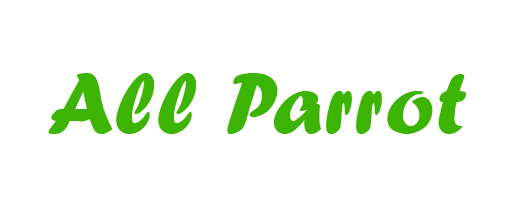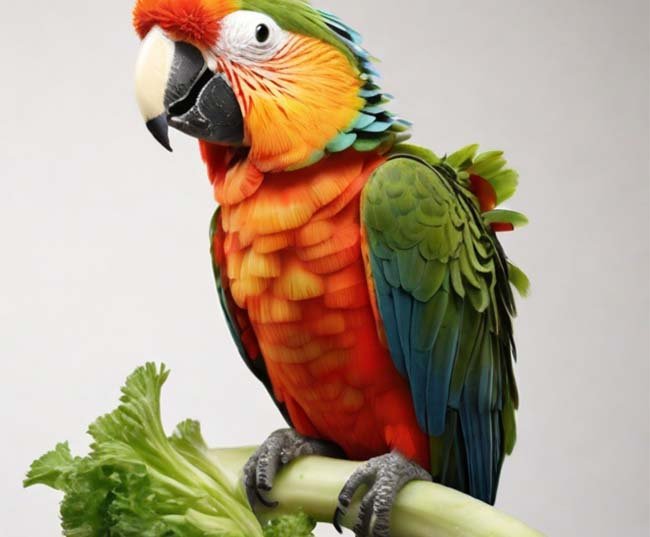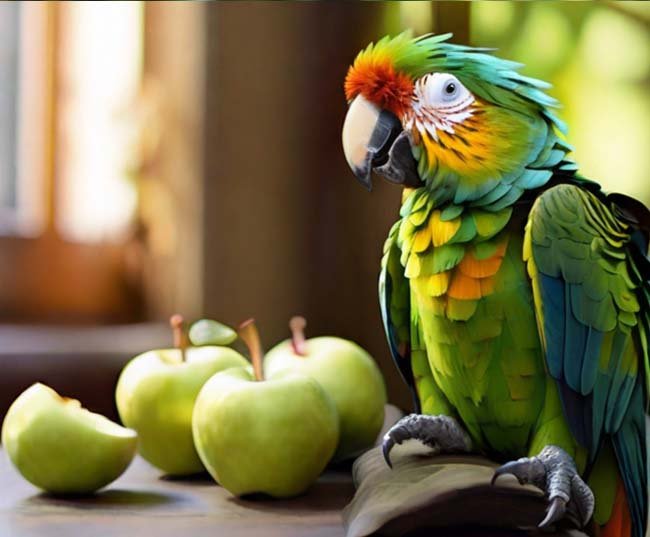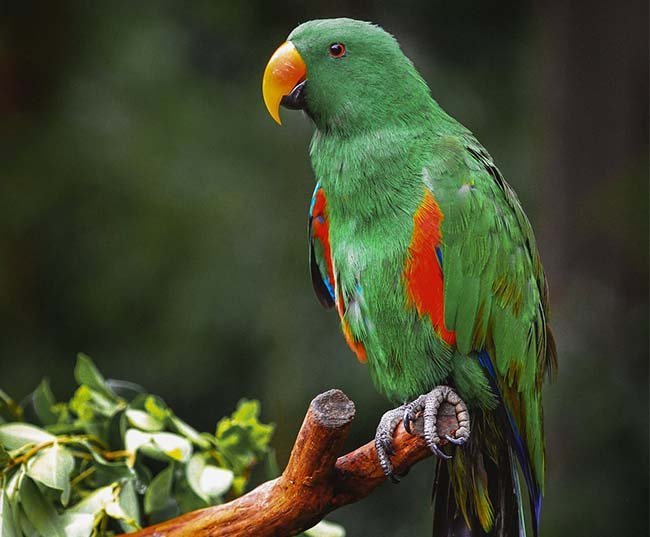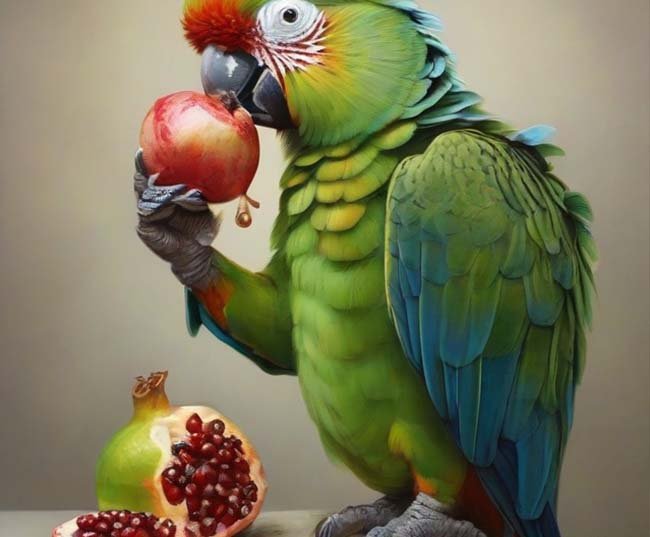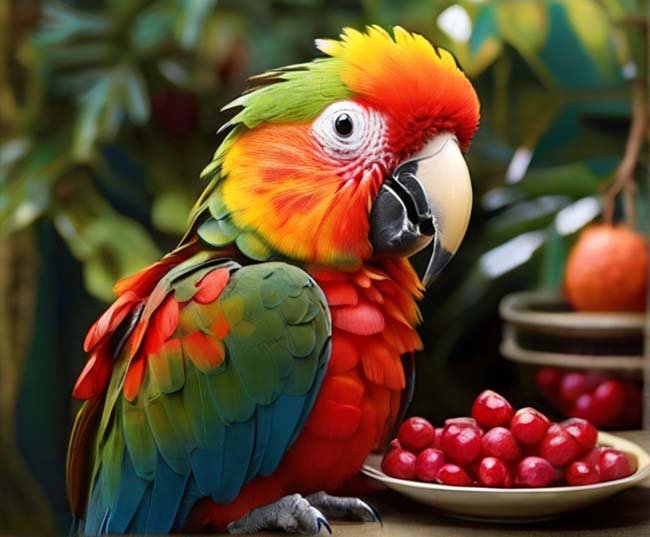Can Parrots Eat Pineapple Safely? Parrot Diet Tips
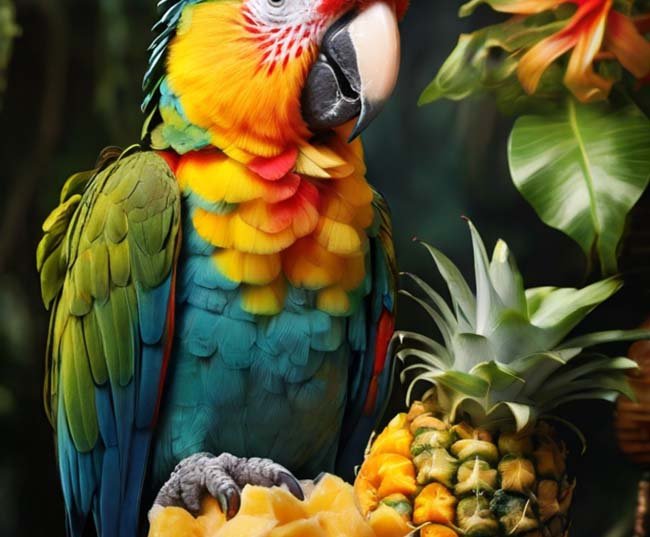
Parrots are beautiful, intelligent birds that make wonderful companions. As a parrot owner, you want to provide your feathered friend with the best possible care, and that includes a healthy and balanced diet.
One question that often arises is whether parrots can safely eat pineapple and how it fits into their diet.
In this article, I will explore the topic of parrots and pineapple, providing important tips on introducing this juicy fruit to your parrot’s meals.
Key Takeaways:
- Pineapple is a safe and nutritious fruit for most parrots when introduced in moderation.
- It’s important to understand your parrot’s dietary needs and monitor their response to pineapple.
- Proper preparation and portion control are essential when feeding pineapple to parrots.
- There are alternative safe fruits to pineapple that can be included in a parrot’s diet.
- Providing a balanced and varied diet is crucial to your parrot’s overall health and well-being
Can Parrots Eat Pineapple?
Yes, parrots can eat pineapple! It’s a safe and healthy treat for them, packed with vitamins and minerals. Just be sure to remove the core and cut the flesh into bite-sized pieces. Enjoy!
Read: Can Parrots Eat Strawberries? Parrot Diet Tips
1). The Nutritional Benefits of Pineapple for Parrots
Pineapple is a delicious and nutrient-packed tropical fruit that can offer many health benefits to your parrot. Here are some of the essential vitamins, minerals, and antioxidants found in pineapple:
| Nutrient | Amount per 1 cup of Pineapple |
|---|---|
| Vitamin C | 131% of the daily value |
| Vitamin B6 | 9% of the daily value |
| Potassium | 7% of the daily value |
| Copper | 9% of the daily value |
| Manganese | 76% of the daily value |
| Antioxidants | Bromelain, beta-carotene, flavonoids |
Vitamin C is crucial for a parrot’s immune system, while vitamin B6 is important for the healthy production of red blood cells and the maintenance of their central nervous system.
Potassium is essential for supporting healthy heart functions, and copper assists with the absorption of iron in the body.
Manganese is a mineral that’s necessary for bone health and for aiding the body’s metabolism.
Furthermore, pineapple contains antioxidants such as bromelain, beta-carotene, and flavonoids that help prevent cell damage and reduce inflammation.
Incorporating pineapple into your parrot’s diet can provide a wide range of nutritional benefits that contribute to your parrot’s overall health and well-being.
2). Understanding a Parrot’s Dietary Needs
As a responsible parrot owner, it’s essential to know your bird’s unique dietary needs.
A healthy parrot diet should consist of a varied mix of fruits, vegetables, grains, and protein sources.
Providing a balanced diet is crucial in maintaining your parrot’s overall health and well-being.
When it comes to parrot food pineapple, it is an excellent addition to a balanced diet. Pineapple is packed with essential nutrients, including vitamin C, calcium, and potassium.
Read: Can Parrots Eat Celery? A Detailed Guide
The components of a healthy parrot diet:
| Category | Examples |
|---|---|
| Fruits | Mango, papaya, berries, kiwi, apple, pear, pineapple |
| Vegetables | Carrot, broccoli, corn, peas, sweet potato, kale |
| Grains | Brown rice, whole grain pasta, quinoa, bread, cereal |
| Protein | Chicken, fish, eggs, tofu, beans, lentils |
It’s important to note that parrot food pineapple should not replace the other components of a parrot’s diet. Pineapple, like any other fruit or food, should be introduced in moderation and alongside a well-rounded meal plan.
Additionally, it’s essential to factor in your parrot’s age, activity level, and health status when devising their diet plan. If you’re unsure about what to include in your parrot’s diet, consult with a veterinarian or avian nutritionist for guidance.
3). Is Pineapple Safe for All Parrots?
As a bird owner, it’s important to understand that not all fruits and vegetables are safe for parrots to consume.
While pineapple is generally considered a safe and healthy addition to a parrot’s diet, there are some factors to consider before adding it to their meals.
First and foremost, it’s important to ensure that the pineapple is fresh and ripe and has been properly prepared before feeding it to your feathered friend.
Additionally, some parrots may be allergic to pineapple, so it’s important to monitor their reaction to the fruit carefully.
When introducing pineapple to your parrot’s diet, it’s also important to remember that moderation is key.
While pineapple does offer a range of health benefits, excessive consumption can lead to digestive issues and other health problems in parrots.
Overall, pineapple is a safe and nutritious addition to a parrot’s diet when introduced and moderated appropriately.
As always, it’s important to consider your parrot’s individual dietary needs and carefully monitor their response to any new foods or changes to their diet.
Read:
4). Introduction and Moderation: How to Safely Introduce Pineapple
Introducing a new fruit like pineapple to your parrot’s diet is an exciting and healthy step, but it should be done with care and moderation. With that in mind, I have put together a list of practical tips to help you safely introduce pineapple to your parrot’s meals and monitor their health during the transition.
Start Small
When introducing pineapple, begin with a small amount, roughly equivalent to the size of your parrot’s beak. This will help their digestive system adjust to the new fruit. Observe your parrot’s reaction to the fruit and only gradually increase the portion size in the following days.
Introduce Consistently
As with any new food, consistency is key. Try offering small amounts of pineapple to your parrot daily or every other day for a week to see how they react. Consistently incorporating new foods into their diet will help improve their digestion and support their overall health.
Monitor their Health
Keep an eye on your parrot’s behavior and overall health during the transition. Watch for any signs of discomfort, such as vomiting or diarrhea. If you observe any of these symptoms, reduce the amount of pineapple you are feeding or stop altogether for a few days and monitor their recovery before gradually reintroducing.
Pair with Other Fruits
Mixing pineapple with other fruits can help your parrot adjust to the new flavors while providing a balanced diet. Offer pineapple alongside other safe fruits such as apples, bananas, or berries.
By taking the time to introduce pineapple gradually and monitoring their response, you can safely integrate this nutritious and flavorful fruit into your parrot’s diet, contributing to their overall well-being and happiness.
5). Preparing Pineapple for Your Parrot
Properly preparing pineapple is key to ensuring it is safe and nutritious for your feathered friend. Follow these steps:
- Wash the pineapple thoroughly to remove any potential pesticides or dirt.
- Peel off the spiky exterior with a knife, ensuring to remove all of the tough skin.
- Remove the tough core in the center of the fruit, as it can be difficult for your parrot to digest.
- Cut the pineapple into small, bite-sized pieces that your parrot can easily consume.
- Store any leftover pineapple in an airtight container in the refrigerator, and discard any uneaten pieces after 24 hours.
By following these steps, you can safely introduce delicious, healthy pineapple into your parrot’s diet.
Read: Can Parrots Eat Cranberries? Step-by-Step Guide
Recommended Portion Sizes and Frequency
When it comes to feeding pineapple to your parrot, moderation is key. While pineapple can be a nutritious addition to their diet, offering too much can have negative consequences for their health.
It’s recommended that pineapple should make up no more than 10% of your parrot’s total food intake per week.
The appropriate portion size for your feathered friend will depend on their size and dietary needs.
As a general guideline, offer no more than half a tablespoon of pineapple per day for smaller parrots, such as budgies or lovebirds.
Larger parrots, such as macaws or cockatoos, can be offered up to a tablespoon of pineapple per day.
It’s essential to consider the balance of your parrot’s overall diet when incorporating pineapple.
Ensure that their meals consist of a variety of fruits, vegetables, grains, and proteins to provide a balanced and nutritious diet.
Remember to monitor your parrot’s health and behavior closely when introducing pineapple to their diet.
If you notice any adverse reactions, such as diarrhea or vomiting, discontinue feeding pineapple or consult with your avian veterinarian.
6). Signs of Allergy or Digestive Issues
As much as I recommend introducing new foods to your parrot’s diet, it’s important to be on the lookout for any potential allergic reactions or digestive issues.
Pineapple is no exception. Here are some common symptoms to pay attention to after introducing pineapple:
- Diarrhea or loose stools: This is a sign that your parrot’s digestive system may not be able to handle the pineapple, or they may have eaten too much.
- Vomiting: If your parrot regurgitates or vomits frequently after consuming pineapple, they may be inducing a reaction to the fruit.
- Loss of appetite: If your parrot becomes less interested in eating their regular food after introducing pineapple to their diet, they may be experiencing digestive issues or may have eaten too much of this new food.
- Difficulty breathing or wheezing: These symptoms should be taken seriously and require immediate vet care, as your parrot may be having a severe allergic reaction.
If you notice any of the above symptoms, stop feeding your parrot pineapple immediately and monitor their health closely.
Consult with your avian veterinarian before reintroducing pineapple or any new foods to their diet. Remember, the safety and health of your parrot are always a top priority.
Read: Can Parrots Eat Apples? A Complete Guide
7). Alternatives to Pineapple in a Parrot’s Diet
While pineapple is a great source of vitamins and minerals for parrots, it’s essential to offer a diverse range of fruits to ensure they get all the necessary nutrients.
The following fruits are also safe for parrots to consume:
| Fruit Name | Nutritional Benefits |
|---|---|
| Mango | High in vitamin C, vitamin A, and fiber |
| Papaya | Contains digestive enzymes, vitamin C, and vitamin A |
| Blueberries | Rich in antioxidants and vitamin C |
| Apples | High in fiber and vitamin C |
| Watermelon | Contains antioxidants and high water content |
When selecting fruit for your parrot, make sure to avoid any that are toxic or unsafe for them to eat.
Some fruits that are toxic to parrots include avocados, cherries, and grapes. Always research first and consult with a veterinarian if you’re unsure about introducing a new type of fruit to your parrot’s diet.
Offering a variety of fruits in moderation can help to keep your parrot’s meals balanced and ensure they receive a wide range of nutrients to maintain overall health and well-being.
8). Frequently Asked Questions about Parrots and Pineapple
As parrot owners consider adding pineapple to their bird’s diet, they may have questions about its safety and how to introduce it. Here are some of the most frequently asked questions about feeding parrots pineapple:
Can all parrots eat pineapple?
While pineapple is generally safe for most parrots, it’s important to introduce it gradually and monitor your bird for any adverse reactions. Some birds may have allergies or digestive issues that make it unsafe for them to consume pineapple.
How do I introduce pineapple to my parrot’s diet?
Introducing new foods to a parrot’s diet should be done slowly and in small amounts to ensure they tolerate it well. Begin by offering small pieces mixed in with their existing food, gradually increasing the amount over time.
How much pineapple should I feed my parrot?
Pineapple should be given in moderation as part of a balanced diet. One to two small pieces of pineapple per week is typically sufficient and allows your bird to enjoy the benefits of this nutritious fruit.
What are the nutritional benefits of pineapple for parrots?
Pineapple is rich in vitamins, minerals, and antioxidants that can benefit a parrot’s overall health. Some of these include vitamin C, vitamin B6, potassium, and magnesium.
Can feeding my parrot too much pineapple be harmful?
Feeding your parrot excessive amounts of pineapple can be harmful due to its high sugar content. It is crucial to moderate the amount of pineapple in your bird’s diet and ensure they are receiving a balanced meal plan.
Are there any risks associated with feeding pineapple to parrots?
While generally safe, some birds may experience digestive issues or allergies when consuming pineapple. It’s essential to monitor your parrot for any adverse reactions and consult with a veterinarian if necessary.
By following these tips and monitoring your bird’s health, you can safely introduce pineapple into your parrot’s diet and enjoy the various nutritional benefits it offers.
9). Tips for Maintaining a Balanced Parrot Diet
As I previously mentioned, a balanced diet is crucial for your parrot’s health and well-being. While pineapple can be a nutritious addition, it should not be the sole focus of their meals. Here are some additional tips for maintaining a balanced parrot diet:
- Offer a variety of fresh fruits and vegetables, including leafy greens, berries, and citrus fruits.
- Incorporate healthy grains, such as quinoa and brown rice, into their meals.
- Provide lean protein sources, like cooked chicken or eggs.
- Avoid feeding your parrot processed foods, sugary treats, or fatty meats.
Remember to offer food in appropriate portion sizes and to monitor your parrot’s weight and overall health regularly.
By following these simple tips and guidelines, you can ensure that your parrot receives a well-balanced and nutritious diet that includes pineapple as part of their meals.
Conclusion
As I have explored in this article, pineapple can be a great addition to a parrot’s diet due to its rich nutritional profile.
However, it’s important to consider your parrot’s specific dietary needs and gradually introduce pineapple to their meals to ensure their health and well-being.
By following the tips and guidelines provided in this article, you can safely incorporate pineapple into your parrot’s meal plan and provide them with a varied and balanced diet.
Remember to monitor your parrot for any signs of allergy or digestive issues and consult with a veterinarian if necessary.
While pineapple is a safe fruit for most parrots, it’s important to remember that it’s not the only option available.
Consider incorporating other safe and nutritious fruits into your parrot’s diet to provide them with a diverse range of nutrients.
Thank you for reading this article on whether parrots can eat pineapple safely. I hope you found it informative and helpful in caring for your feathered friend!
FAQ
Can parrots safely eat pineapple?
Yes, parrots can safely eat pineapple as part of their diet. However, some considerations must be taken into account before introducing pineapple to a parrot’s meals.
What are the nutritional benefits of pineapple for parrots?
Pineapple is rich in vitamins, minerals, and antioxidants that can benefit the health of parrots. It provides essential nutrients like vitamin C, vitamin A, and manganese.
What should I know about a parrot’s dietary needs?
Before adding pineapple to a parrot’s diet, it’s important to understand their specific dietary requirements.
A healthy parrot diet consists of balanced amounts of fruits, vegetables, whole grains, and high-quality parrot pellets.
Is pineapple safe for all parrots?
While pineapple is generally safe for most parrots, there may be some exceptions. For example, parrots that have specific health conditions or dietary restrictions might need to avoid pineapple.
It is always best to consult with a veterinarian or avian specialist before introducing new foods to a parrot’s diet.
How should I introduce pineapple to my parrot’s diet?
It’s important to introduce pineapple gradually and in moderation. Start by offering small pieces of pineapple and observe your parrot’s reaction and digestion.
If there are no adverse effects, you can gradually increase the amount over time.
How should I prepare pineapple for my parrot?
Before offering pineapple to your parrot, make sure to remove the skin, core, and any seeds. Cut the pineapple into small, bite-sized pieces that are easy for your parrot to consume.
What are the recommended portion sizes and frequency of pineapple consumption for parrots?
The portion size and frequency of pineapple consumption will depend on the size and overall diet of your parrot.
As a general guideline, offering a few small pieces of pineapple a few times a week can be a good start. However, it’s always best to consult with your veterinarian or avian specialist for personalized recommendations.
What are the signs of allergy or digestive issues in parrots after consuming pineapple?
Common signs of allergy or digestive issues in parrots include diarrhea, vomiting, and changes in behavior or appetite.
If you notice any of these symptoms, it’s essential to discontinue feeding pineapple and consult with a veterinarian as soon as possible.
Are there alternatives to pineapple that I can offer my parrot?
Yes, there are many other safe and nutritious fruits that you can offer your parrot as alternatives to pineapple.
Some examples include apples, bananas, berries, mangoes, and oranges. Remember to introduce new fruits gradually to monitor your parrot’s response.
What are some tips for maintaining a balanced parrot diet with pineapple?
To maintain a balanced parrot diet, it’s important to offer a variety of fruits, vegetables, whole grains, and high-quality parrot pellets.
Pineapple can be incorporated into their meals as a healthy and tasty treat. However, remember that moderation is key, and pineapple should not be the sole focus of their diet.
